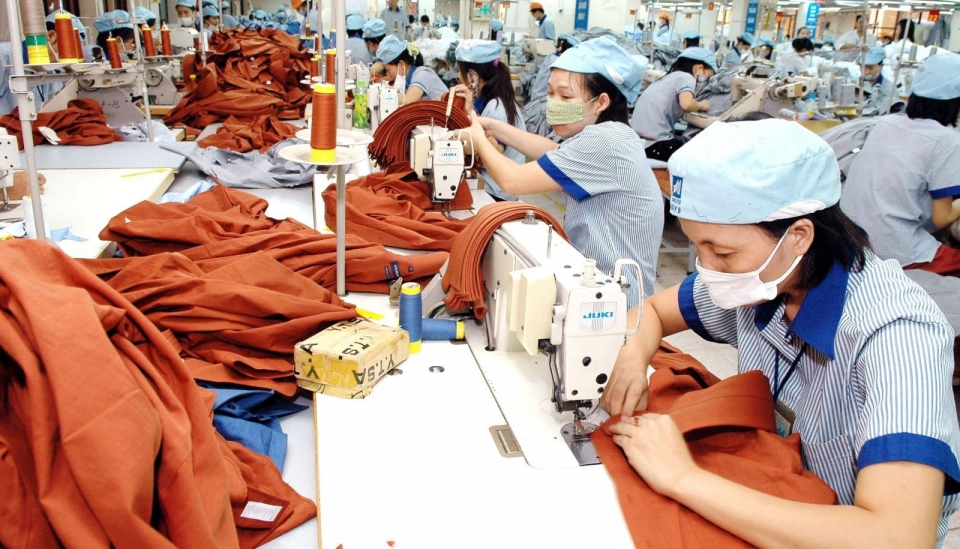
Sustainable initiatives propel Vietnam's textile and garment industry forward: Scholar
Latest
 |
| Sustainable initiatives propel Vietnam's textile and garment industry forward: Vietnam's textile and garment industry needs to invest in green technologies, adopt sustainable practices, and ensure transparency in their supply chains. (Photo: NDO) |
Data provided by the Vietnam Textile and Apparel Association (VITAS) shows that the textile and garment export turnover reached 18.6 billion USD in the first half of 2023, marking a 17.6% decline compared to the corresponding period in the previous year.
Moreover, the World Trade Organization's statistics also demonstrate that Vietnam's share of the global textile market is about 5.7%, with Bangladesh slightly ahead at 6.5%. This indicates a highly competitive environment, where other countries are also striving to increase their market share.
There is a significant shift towards green transformation, with an increasing focus on producing raw materials from recycled or organic sources. Consumers, brands, and regulators are increasingly demanding that products be produced in an environmentally friendly manner. This shift is driving significant changes in the industry, and companies that do not adapt risk being left behind.
Adopting sustainable practices is not just about meeting these new requirements, but also about seizing strategic opportunities such as meeting global standards, efficiency and cost savings, and attracting investment.
To meet these requirements, Vietnam's textile and garment industry needs to invest in green technologies, adopt sustainable practices, and ensure transparency in their supply chains. It is also important to work closely with stakeholders, including Government, NGOs and communities, to ensure a holistic approach to sustainability.
Financial support and incentives: The Government acknowledges that the transition to sustainability demands substantial financial commitment from businesses. To ease this burden and facilitate the industry's green metamorphosis, financial support mechanisms will be put into place.
These include grants, low-interest loans, and tax incentives for enterprises willing to invest in sustainable technologies and eco-friendly practices. By providing this crucial financial backing, the government aims to make sustainability a feasible and attractive choice for numerous businesses in the sector.
Support research and development: To drive the development of novel sustainable materials and technologies, the government, in collaboration with industry associations, will establish comprehensive research and development initiatives.
Research projects focusing on eco-friendly alternatives will receive funding, and strategic partnerships will be forged with renowned universities and research institutions. Additionally, businesses that invest in research and development to advance sustainability efforts will be rewarded with incentives.
Encourage the import of clean technologies: To accelerate the transition to sustainability, the government aims to foster the import of clean, high-tech, and renewable technologies. To achieve this, reduced tariffs and other incentives will be introduced. By easing the acquisition of cutting-edge sustainable technologies, businesses will gain access to the essential tools needed to enhance their eco-friendly practices.
Develop sustainable industrial zones: The strategy of building several large textile and garment industrial zones with preferential policies for large-scale projects from reputable investors using advanced and modern technology, ensuring compliance with environmental regulations, should be pursued. These zones should have proper wastewater treatment systems and should comply with all environmental regulations.
The industry is focusing on sustainable production practices and digital transformation. These strategies not only align with global sustainability trends but also improve efficiency and reduce costs.
VITAS needs to play a crucial role in promoting technological changes in all Vietnamese textile and garment businesses to meet the green standards of developed countries.
Firstly, VITAS represents the interests of the Vietnamese textile and garment industry and its member businesses. They have the capability to interact with government agencies, international organisations, and relevant partners to present requirements, concerns, and propose solutions for technological changes. VITAS also serves to disseminate information, technology, and experiences regarding green standards and technological changes. Meetings, workshops, training sessions, and seminars can be organised to provide the latest information, helping companies better understand requirements and regulations.
Moreover, VITAS can support textile and garment businesses in accessing vital financial and technological resources necessary for successful technological transitions. By collaborating with sponsors, banks, and partners, VITAS has the ability to develop funding and technical assistance programs, empowering enterprises to embrace cutting-edge technologies.
Additionally, VITAS can participate in negotiations and consultations with international partners and governments. By influencing policies and regulations, they foster an environment conducive to technological advancements and green standards implementation.
VITAS is also capable of creating a network of cooperation within and beyond the textile and garment industry. This network includes material suppliers, technology manufacturers, research organisations, and other associations. The exchange of information and sharing of experiences enable businesses to learn from each other, foster innovation, and explore collaboration opportunities.
Recently, VITAS has also proposed a sustainable development program, emphasising the need for special support policies, such as reduced taxes and mechanisms for accessing loan capital. Government support is essential to enable businesses to invest in new technologies, machinery, and equipment necessary for sustainable production.
While the challenges faced by the textile and garment industry are significant, the recent increase in interest from international partners and the industry's adaptability provide reasons for optimism. The diversification of markets focuses on sustainability, and government support can contribute to a potential recovery and growth in Vietnam's textile and garment exports in the second half of this year.





















